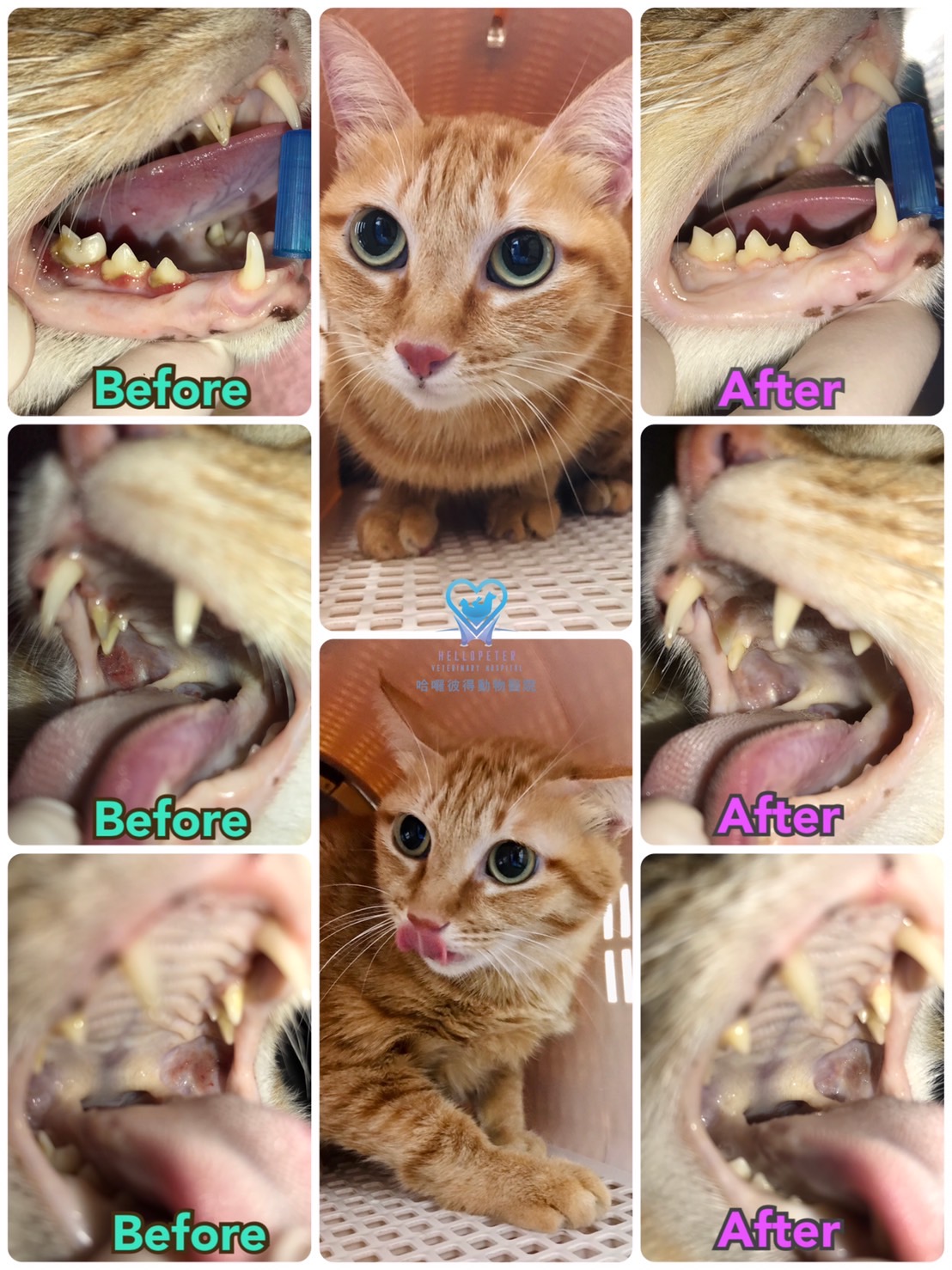Added on January 31, 2023 - Healing of FCGS in an 3-year-old 8-month-old orange tabby female cat.
 “Milk Caramel” is a mixed breed female orange tabby cat, she was 3 years and 8 months old when the owner brought her to start the Mucogingival Replacement Surgery (MGRS) treatment with Dr. Chung-Wei Chen in our hospital, and she was 4 years and 2 months old when the MGRS treatment ended.
“Milk Caramel” is a mixed breed female orange tabby cat, she was 3 years and 8 months old when the owner brought her to start the Mucogingival Replacement Surgery (MGRS) treatment with Dr. Chung-Wei Chen in our hospital, and she was 4 years and 2 months old when the MGRS treatment ended.
Feline chronic gingivostomatitis (FCGS) causes redness, swelling and inflammation of the gingiva and oral mucosa of oropharynx in the patient, and oral pain leads to loss of appetite and slow eating speed, when touching the right cheek, she will try hard to resist.
During the treatment of FCGS, the patient was found to have bladder stones and needed surgery, so we waited for her bladder to return to normal before continuing to treat FCGS with MGRS.
After 6 months of MGRS treatment, the redness and swelling caused by FCGS have completely disappeared, her appetite is good, and she will no longer resist touching her cheeks, Dr. Chen did not do any extraction, all the teeth were preserved, her FCGS has been completely cured, and she can live a normal life without injections or medicines.
The owner has another cat with FCGS who is currently being treated at our hospital.
Feline chronic gingivostomatitis (FCGS) is one of the common oral diseases in cats. The main symptoms are:
- The gingiva and oral mucosa are red, swollen, ulcers or hyperplasia. All soft tissues in the mouth, including the gingiva and all parts of the oral mucosa (including buccal, lingual, sublingual and oropharynx, etc.), will have redness, ulceration or hyperplasia.
- Cats will lose their appetite or even refuse to eat because of mouth pain, or they will keep shaking their heads and scratching their mouths with their front feet when eating and drinking.
- The patient's saliva usually has a peculiar smell, even putrefactive odor, due to ulcers.
At present, the most common treatments are long-acting steroid injections or oral steroids, combined with antibiotics, and tooth extraction, etc., but the effect of individual treatment varies greatly, furthermore, tooth extraction will likely cause the cat's oral cavity to collapse and alveolar bone loss. They need lifelong medication and can't stop it.
Dr. Chung-Wei Chen's original Mucogingival Replacement Surgery (MGRS) aims to solve the above-mentioned sequelae and difficulties in the treatment of stomatitis, and make cats with FCGS no longer need to take medicine for a long time after recovery, and return to the normal life they had before the illness.
If you want to see more cat patients cured by MGRS in our hospital, please refer to our official website (www.hellopeter.com.tw/contents-4. html) or Facebook fan page album (www.facebook.com/media/set/?set=a.1308046286294231&type=3).
HelloPeter Veterinary Hospital
Director: Dr. Chung-Wei Chen (Dr. Richard Chen)
YouTube channel: https://www.youtube.com/@DrRichardChen_vet
Facebook: https://www.facebook.com/vet.dentistry.oral.medicine
Phone: +886-4-2472-8828
Address: No. 29, Sec. 2, Dongxing Rd., Nantun Dist., Taichung City 408, Taiwan
Hospital Hours: Monday to Friday 10:00~20:00 (by appointment only), 12:00 to the end of all appointments on Saturday, Closed on Sunday
#
陳重威獸醫師 #
哈囉彼得動物醫院 #
HellPeterVeterinaryHospital #
動物牙科推薦 #
寵物牙科推薦 #
牙齦黏膜置換手術 #
mucogingivalreplacementsurgery #
MGRS
#
貓 #
貓口炎 #
口炎貓 #
狗口炎 #
cat #
dog
#
動物口腔外科 #
獸醫牙科 #
pet #
阿威獸醫師的開口啟齒 #
FCGS #
Felinechronicgingivostomatitis



